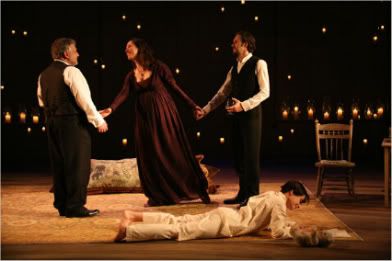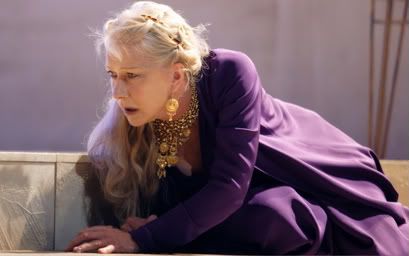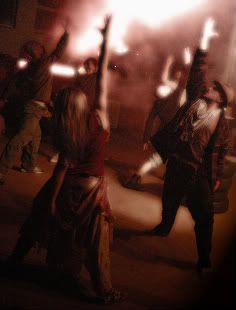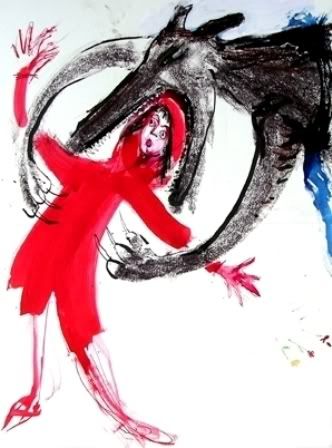 A Winter's Tale
A Winter's Tale &
The Cherry Orchard - The Bridge Project
The Old Vic, Waterloo
“O, call back yesterday, bid time return” is the quotation which lines the safety curtain of The Bridge Project’s premiere year’s offerings. This rather apt quotation from Richard III alludes to central themes in both plays: the passing of time and regret. Choosing to direct an Anglo-American cast in a production of William Shakespeare’s
The Winter’s Tale and Anton Chekhov’s
The Cherry Orchard, is an impressive undertaking for director Sam Mendes, and certainly promises to be something special.
Combining Shakespearean and Chekhovian repertoires has long been a favoured challenge to theatre directors, for, despite living and writing centuries apart, on opposite sides of Europe in different languages and even alphabets, a number of parallels can be drawn between the playwrights’ works. Indeed, the broadness of the scope is indicative of The Bridge Project’s overarching aim to create a transatlantic partnership which transcends the boundaries of theatre and enriches the stage with the best of what UK and US acting has to offer.
Simon Russell Beale heads the all-star line-up, playing Lophakin in
The Cherry Orchard and King Leontes in
The Winter’s Tale. As Lopakhin, Russell Beale exudes a suitable sense of exasperation as he watches Ranevskaya and her clan fail to save their estate from soon passing into other hands. As a descendant of the peasantry and serfs, the tables are turned when Lopakhin himself buys the estate, both usurping the wealthy landowners’ status and depriving them of their most prized possession: the bountiful cherry orchard. Russell Beale draws out Lopakhin’s vengeance in a cathartic scene where he storms around the stage flinging chairs left, right and centre, as Ranevskaya, superbly played by Sinéad Cusack, looks on in dismay.
Yet it is as the brooding Leontes that I feel Russell Beale’s vitriol is well and truly unleashed. Consumed by jealousy, he believes his wife Hermione, played expertly here by Rebecca Hall, is having an affair with his childhood friend Polixenes, played by Josh Hamilton. Leontes banishes Polixenes, throws Hermione into prison and orders his menservants to dispose of the baby daughter who he believes is Polixenes’ child, not his own. In contrast to the resigned and somewhat powerless Varya in
The Cherry Orchard, Hall’s beguiling Hermione shows strength as she stands up to her husband. The trial scene, which sees Russell Beale and Hall confront one another from opposite ends of a long wooden table, is at once powerful and visually effective. Both actors gauge the level of visceral emotion perfectly, holding it back to make every line uttered retain the necessary resonance Shakespeare originally intended. As Varya, Hall’s quiet exasperation is equally entrancing and the audience feels her frustration at the almost absurd nature of Lopakhin’s amorous indecisiveness─ a man of business, when it comes to love he is almost as hopeless as the ungainly Yepikhodov played by Tobias Segal.
For although this may not be the most popular of Chekhov-Shakespeare pairings, the comic and tragic elements of both plays are drawn out and certainly neither play falls into a single genre: both have elements of intense tragedy, inane comedy and even farce. Sir Tom Stoppard’s commissioned translation of
The Cherry Orchard is based on a literal translation by Helen Rappaport. Without doubt, Stoppard’s version draws out the satire of Chekhov’s work, illustrating that these characters’ concerns are not so far removed from our own in the twenty-first century. Indeed, as Mendes’ interpretations of both these plays capably illustrate, the issues of economic uncertainty, bereavement, jealousy, regret, love and desire are emotions of everyday life very much in the here and now. Moreover, as both Paul Jesson, as Ranevskaya’s loquacious brother Gaev, and Richard Easton's bumbling old serf Firs, skilfully highlight, what Stoppard and Mendes´ collaboration definitively succeeds is in revealing the characters’ myopic view of the world and how none of the characters listen to anyone but themselves. It is only a shame that Morven Christie’s Anya lacked the necessary emotional intensity and vigour originally conceived by Chekhov.
Wary of being too critical about the blend of accents in this multi-national cast, it will suffice to say that occasionally the American accent, and at times regional UK accents, seem somewhat out of place. However, any jarring detected does not detrimentally detract from the overall effectiveness or fluidity of the performance. Taking Dakin Matthew - Simeonov in Chekhov's play - as a prime example, there was no attempt to hide his American accent, but in a strange way the prevalence of the accent itself succeeded in accentuating the almost caricature-like figure of this old brazen fool. Overall, Stoppard’s translation works for this production but occasional references, such as when the hopeless Yepikhodov is nicknamed “catastrophe corner”, seem rather misplaced and perhaps not the most judicious of translation decisions.
The Winter’s Tale also presents some problems, particularly in Act Four when the pastoral scene disintegrates into a farcically anachronistic affair involving erotic dancing with balloons. However, a certain measure of modernisation also works well: Ethan Hawke’s Autolycus comes across as a mix between Johnny Depp in
Pirates of the Caribbean and Dickens’ Fagin and he certainly gets his fair share of laughs. Also playing Chekhov’s perpetual student Trofimov, Hawke is perhaps in one sense one of the most prevalent examples of how this project proves to be an exercise in which actors can show off their range and rise to different challenges. Sinéad Cusack also deserves particular mention for her utterly captivating performances: proving to be a compelling Paulina in
The Winter´s Tale, she really shines in reflecting all the forlorn sadness of the grieving and emotionally unstable Ranevskaya whose dwelling on the past prevents her from coming to terms with the present.
This exciting venture, although not without its faults, certainly lives up to expectations and the combination of the calibre acting, creative stage design and judicious direction creates two very fine productions. Although logistically challenging, with a 50:50 split between cast and a production team spanning the British Isles and the USA, perhaps it is innovative ventures like this which are exactly what will keep the theatre industry afloat during these difficult times.
A Winter's Tale and
The Cherry Orchard run in rep until 15th August
Ruth Collins












